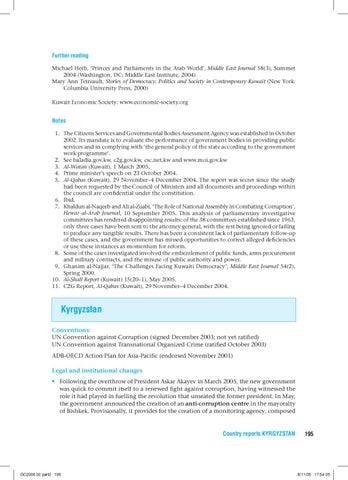Further reading Michael Herb, ‘Princes and Parliaments in the Arab World’, Middle East Journal 58(3), Summer 2004 (Washington, DC: Middle East Institute, 2004) Mary Ann Tetreault, Stories of Democracy. Politics and Society in Contemporary Kuwait (New York: Columbia University Press, 2000) Kuwait Economic Society: www.economic-society.org
Notes 1. The Citizens Services and Governmental Bodies Assessment Agency was established in October 2002. Its mandate is to evaluate the performance of government bodies in providing public services and in complying with ‘the general policy of the state according to the government work programme’. 2. See baladia.gov.kw, c2g.gov.kw, csc.net.kw and www.moi.gov.kw 3. Al-Watan (Kuwait), 1 March 2005. 4. Prime minister’s speech on 23 October 2004. 5. Al-Qabas (Kuwait), 29 November–4 December 2004. The report was secret since the study had been requested by the Council of Ministers and all documents and proceedings within the council are confidential under the constitution. 6. Ibid. 7. Khaldun al-Naqeeb and Ali al-Zuabi, ‘The Role of National Assembly in Combating Corruption’, Hewar al-Arab Journal, 10 September 2005. This analysis of parliamentary investigative committees has rendered disappointing results: of the 38 committees established since 1963, only three cases have been sent to the attorney general, with the rest being ignored or failing to produce any tangible results. There has been a consistent lack of parliamentary follow-up of these cases, and the government has missed opportunities to correct alleged deficiencies or use these instances as momentum for reform. 8. Some of the cases investigated involved the embezzlement of public funds, arms procurement and military contracts, and the misuse of public authority and power. 9. Ghanim al-Najjar, ‘The Challenges Facing Kuwaiti Democracy’, Middle East Journal 54(2), Spring 2000. 10. Al-Shall Report (Kuwait) 15(20–1), May 2005. 11. C2G Report, Al-Qabas (Kuwait), 29 November–4 December 2004.
Kyrgyzstan Conventions: UN Convention against Corruption (signed December 2003; not yet ratified) UN Convention against Transnational Organized Crime (ratified October 2003) ADB-OECD Action Plan for Asia-Pacific (endorsed November 2001) Legal and institutional changes • Following the overthrow of President Askar Akayev in March 2005, the new government was quick to commit itself to a renewed fight against corruption, having witnessed the role it had played in fuelling the revolution that unseated the former president. In May, the government announced the creation of an anti-corruption centre in the mayoralty of Bishkek. Provisionally, it provides for the creation of a monitoring agency, composed
GC2006 02 part2 195
Country reports kyrgyzstan
195
8/11/05 17:54:05
